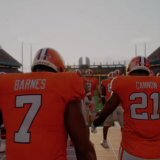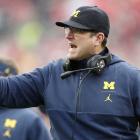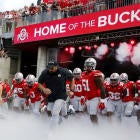
The Michigan sign-stealing investigation has been put on an apparent "very fast timeline" by the NCAA, sources tell CBS Sports. This as Wolverines coach Jim Harbaugh has been suspended by the Big Ten for the final three games of the 2023 regular season amid a violation of the conference's sportsmanship policy.
Michigan athletic director Warde Manuel raised interest this week when, in response to the Big Ten's inquiry on the subject, he noted that the NCAA enforcement staff "indicated [the NCAA investigation] is due to be completed this fall." (The italics for emphasis appeared in the letter.)
The fall ends Dec. 21, which would mark two months since news broke of the sign-stealing scandal.
It's not clear when exactly the NCAA investigation began, but sources close to the situation at Michigan tell CBS Sports it appears the process is being fast tracked.
Michigan has already received a notice of inquiry from the NCAA, the first step in any investigation.
However, the school has yet to receive a Notice of Allegations (NOA) in the case, sources tell CBS Sports. That's the official document from the NCAA that details specific wrongdoing the enforcement staff has uncovered. At that point, the school gets a copy of the full investigative file from the NCAA with 90 days to respond. Following that, the enforcement staff has 60 days to answer the school's response.
"You're half a year away [from the case being resolved]," said Jason Montgomery, a sports law attorney and former NCAA investigator.
That would be an extremely fast timeline. The average infractions case can last a year or more. If penalties are contended, the average appeals case lasts eight months.
Harbaugh is already under investigation in a separate case for allegedly misleading NCAA investigators in an inquiry regarding alleged recruiting violations amid the COVID-19 pandemic. Michigan had reached a negotiated resolution in the case for Harbaugh to be suspended for the first four games of this season. However, the Committee on Infractions intervened in August and instead opened a full investigation.
To mitigate any possible penalties in that case, Michigan self-imposed a three-game suspension on Harbaugh. The possibility now exists that Harbaugh could be the subject of two separate NCAA cases involving allegations of major violations.
If the two ongoing cases aren't consolidated by the enforcement staff, Michigan could be considered a "repeat violator" under the NCAA penalty matrix. The worst-case scenario for a repeat violator is the death penalty, but that is considered highly unlikely in any case going forward.
In fact, the likelihood of a postseason ban has been lessened considerably by recent NCAA guidelines.
Complicating matters, Michigan has yet to receive an NOA in that first case alleging Michigan held practices with too many coaches on the field, contacted two prospects during the extended COVID-19 dead period and observed practices via an unauthorized video feed. The Level I violation (most serious) is that Harbaugh misled the NCAA when it approached him with the allegations.
Michigan received a draft NOA in January, but that document never got finalized.
Harbaugh has said he was unaware of Connor Stalions' alleged improper scouting. NCAA rules prohibit advance scouting and filming of opponents. Even if it is deemed Harbaugh did not have prior knowledge of Stalions' moves, the coach can still be individually sanctioned by the NCAA due to a coach responsibility bylaw that states those in charge "shall be" responsible for the actions of their staff.
Legal sources representing Harbaugh have intimated they will fight any suspension from the Big Ten over the sign-stealing scandal by taking legal action. Michigan is familiar with head coaches receiving multi-game suspensions for violations of the Big Ten Sportsmanship Policy. It did not fight such a penalty in 2022 when it was handed to Juwan Howard of the men's basketball team.





















